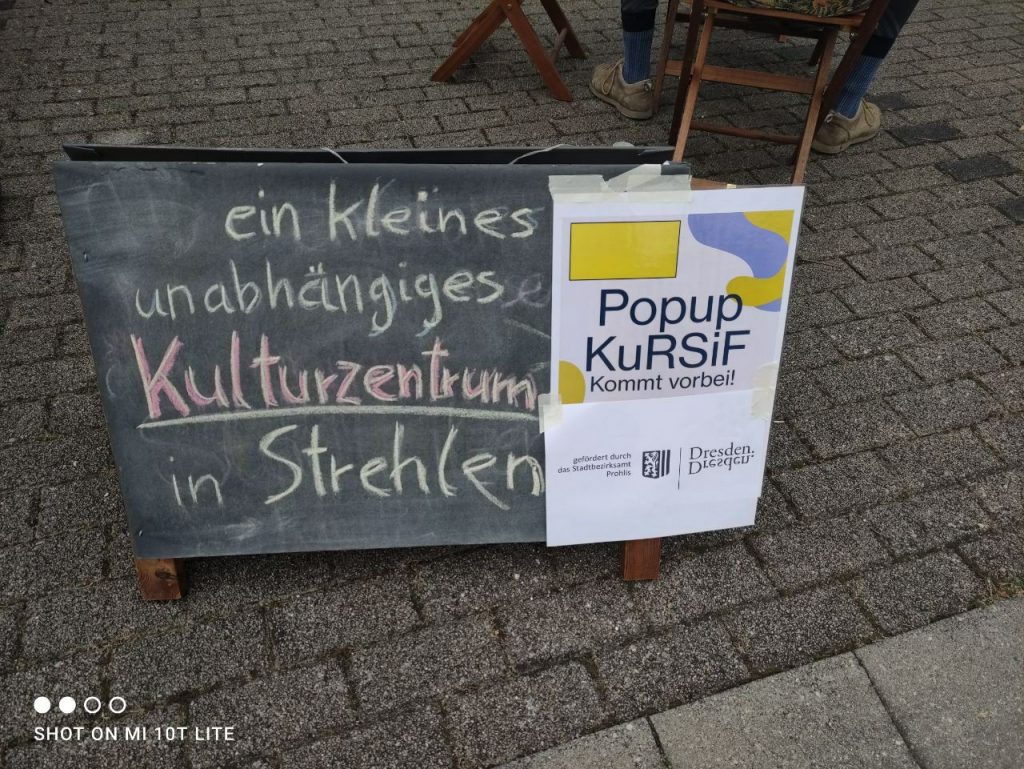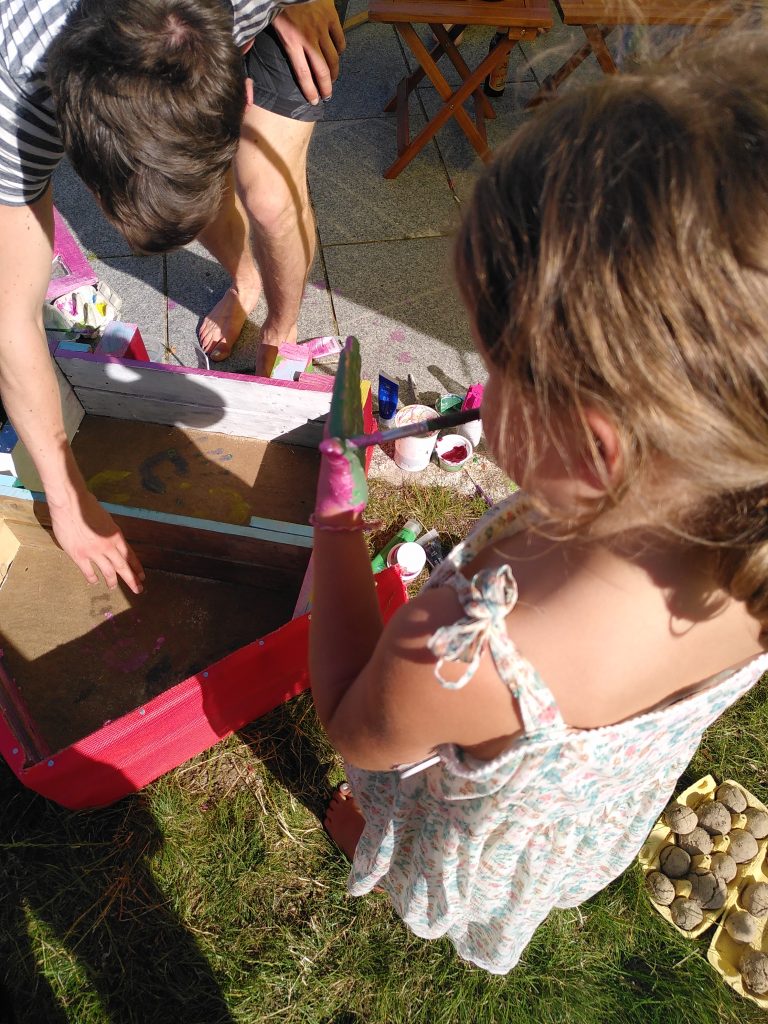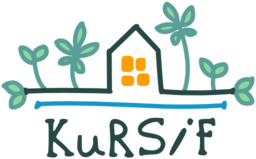Briefly?
We are a group of different people who would like to expand the neighbourly offer in the Dresden district called Strehlen. We have already found premises here in the women’s education centre and furnished them nicely. With these rooms we would like to offer a freely accessible place for networking and all kinds of events. These can be seminars, exhibitions, swap meets, meals, courses, lectures or anything else you can think of. We are happy if you want to use our rooms, have project ideas or just drop by. We can best be reached by email or at the plenums.

The space, the KuRSiF, (as well as the Kaitzbachkastanie e.V. behind it and all the associates) should stand for helpfulness, joy in discussion, tolerance, freedom from hierarchy, informality and fun. Respectful interaction, mutual appreciation, goodwill and understanding for each other are fundamental to this, because we are in a constant learning process.

Participate? Support?
We are always happy to receive active support for the realisation of projects, for background work, for ideas, simply for everyone who shares our goals and wants to get involved in a lively neighbourhood. Just drop by at the plenum. Financial support (supporting members) is also important for our work.
What kind of problem did we see? Why did we find each other?
In Strehlen there are hardly any opportunities for people to get to know each other, exchange ideas and network. Especially for newcomers from other parts of the city, the surrounding area or other places, it is difficult to make connections and thus feel at home in Strehlen in the long term. The existing offers (e.g. Ausländerrat e.V. and Frauenbildungshaus) are great, but mostly do not address the broad population.
The big processes of shaping things on a global – but also national – level quickly take on confusing proportions of complexity and scare people off. Many people look for simplicity and unambiguity. Yet complexity, diversity and ambiguity need not be negative. If anything, these qualities, which are summarised in English as „ambiguity“, have declined and have even always been part of the history of human development and life (Thomas Bauer, 2018).
The effects of the Covid19 pandemic have once again shown that people with different ideas of life are increasingly segregating themselves, discourse is becoming more rare as the points of contact are becoming rarer. Increasing isolation (gentrification) and retreat into the private sphere also characterise everyday life in Strehlen. Many groups of people live here with different ideas or demands on the kind of housing quality they want to live with. The district is bursting with diversity of generations, cultural backgrounds, Y, Z, but this diversity is not always felt in the neighbourhood.
We think people lack a meeting space, as well as cultural offerings, a place where they can implement their ideas. More and more young, committed people are moving to Neustadt or other neighbourhoods where they can find more diverse offers. The idea of building and changing something locally is quickly dismissed. That is why we think it is especially important to create such opportunities at a local level, as the threshold for getting involved is particularly low here and it is easier to have positive experiences and celebrate successes. Diversity, ambiguity and change could then lose their intimidating character and become a pleasure.
How is KuRSiF supposed to change this?
KuRSiF can break down barriers and obstacles by bringing people with -and also without- ideas and ambitions together. KuRSiF offers a self-governing, non-profit-oriented space where neighbourhood and the shaping of Strehlen as well as people from outside Strehlen who are interested in what is on offer can meet. Volunteer initiatives, other project groups or communities of interest find a place to meet here, as do local artists who want to exhibit their art. Just as a space is offered, where people can make music together and musicians can create musical educational opportunities and people who can realise language courses, workshops, lectures or similar educational opportunities.
We do not understand space as a container in which something is, but as a social construct that changes and is created by the people who use it, visit it, or simply know it. Accordingly, we hope that the impact of space and our projects will grow beyond the boundaries of space. We believe in a right to the city and also see public space as a potential area for projects in the spirit of the association.
We believe that the empowerment of participation and the sense of co-creation that comes with it is a profoundly peacemaking value. Empowered people need a low-threshold space to try out this social co-creation, positive experiences or sometimes simply contact with people with similar goals to dare to take the first steps. It is important to us that people experience self-efficacy in this trying out and thus begin to get more involved in society.
How do we work as a group?
Every week we meet for a plenary session, i.e. a meeting. Here we exchange information about everything that is happening in, around and for KuRSiF. And here we decide together when there is something to decide. We welcome every person who wants to have a say, all votes count equally and all concerns are heard.
The plenary is also the place where we talk about new projects.
We divide the organisational and planning tasks into working groups (German: Arbeitsgruppe = AGs). People who have the time and the inclination get involved in these groups. The opportunities to get involved are very varied and don’t all feel like work.
No one has to take on tasks. You don’t have to do anything! ♪
Those who don’t have time and/or feel like taking on tasks are just as welcome as those who can just take on a lot of tasks. It may sound unusual, but:
Before we take on too much, it’s better that nothing happens here. In order to have fun in the long run, we do not rely on pressure, stress and competitive thinking. It is part of the project that we also feel good. We also try to have regular group days so that we can get to know each other better. Sometimes we also try to exchange skills and we always eat.
The name
KuRSiF is an abbreviation for Kultur-Raum Strehlen im Frauen*Bildungshaus (the Women*’s Education Centre) and deliberately alludes to so-called italics. In these types of writing, the letters – such as in cursive and Arabic (italic=مائل) – are connected (Waldow, 1884, p. 31). KuRSiF thus stands for more connectedness and beauty in the district.
Waldow, A. (1884) Illustrierte Encyklopädie der graphischen Künste: Leipzig.
Thomas Bauer (2018) The unambiguation of the world – on the loss of ambiguity and diversity. 13, edn. Stuttgart: Reclam.
Inspiration
We were influenced from different sides and looked a bit at other initiatives to see what direction we could go in. Similar district initiatives in Dresden are
the PlatzDa!
the Zwickmühle in Plauen,
the district association In Gruna Leben e.V.
and certainly more. We look forward to hearing about other initiatives.
Thanks to the house project 2n40, who support us technically, the city district office Prohlis of the state capital Dresden, our members and supporters and all active supporters, the sponsors who supported us financially in the early days, when everything was still just an idea.
